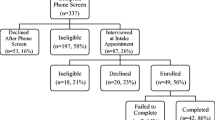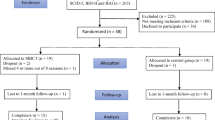Abstract
The perinatal period is a high-risk time for mood deterioration among women vulnerable to depression. This study examined feasibility, acceptability, and improvement associated with mindfulness-based cognitive therapy (MBCT) in perinatal women with major depressive disorder (MDD) or bipolar spectrum disorder (BSD). Following a diagnostic evaluation, 39 perinatal women with a lifetime history of MDD (n = 27) or BSD (n = 12) enrolled in an 8-week program of MBCT classes (2 h each) that incorporated meditation, yoga, and mood regulation strategies. Participants were pregnant (n = 12), planning pregnancy (n = 11), or up to 1-year postpartum (n = 16). Participants were self-referred and most had subthreshold mood symptoms. Assessments of depression, (hypo)mania, and anxiety were obtained by interview and self-report at baseline, post-treatment and at 1- and 6-month post-treatment. Women with a history of MDD were more likely to complete the classes than women with BSD. Of 32 women who completed the classes, 7 (21.9 %) had a major depressive episode during the 6-month post-treatment follow-up. On average, participants with MDD reported improvements in depression from pre- to post-treatment. Mood improvement was not observed in the BSD group. In the full sample, improvements in depression symptoms across time points were associated with increasing mindful tendency scores. This study was limited by its uncontrolled design, heterogeneous sample, and questionnaire-based assessment of mindfulness skills. MBCT may be an important component of care for perinatal women with histories of major depression. Its applicability to perinatal women with BSD is unclear.


Similar content being viewed by others
References
American Psychiatric Association. (2000). Diagnostic and statistical manual of mental disorders, (text revision) (DSM-IV-TR) (4th ed.). Washington, DC: American Psychiatric Press.
Baer, R. A., Smith, G. T., Lykins, E., Button, D., Krietemeyer, J., Sauer, S., et al. (2008). Construct validity of the Five Facet Mindfulness Questionnaire in meditating and nonmeditating samples. Assessment, 15, 329–342. doi:10.1177/1073191107313003.
Bar-Oz, B., Einarson, T., Einarson, A., Boskovic, R., O’Brien, L., Malm, H., et al. (2007). Paroxetine and congenital malformations: Meta-analysis and consideration of potential confounding factors. Clinical Therapeutics, 29(5), 918–926.
Beck, A. T., Steer, R. A., & Brown, G. K. (1996). Beck Depression Inventory-II. San Antonio, TX: The Psychological Corporation.
Cohen, L. S. (2007). Treatment of bipolar disorder during pregnancy. Journal of Clinical Psychiatry, 68(Suppl 9), 4–9.
Davidson, R. J. (2010). Empirical explorations of mindfulness: Conceptual and methodological conundrums. Emotion, 10(1), 8–11. doi:10.1037/a0018480.
Deckersbach, T., Hölzel, B. K., Eisner, L. R., Stange, J. P., Peckham, A. D., Dougherty, D. D., et al. (2012). Mindfulness-based cognitive therapy for nonremitted patients with bipolar disorder. CNS Neuroscience & Therapeutics, 18(2), 133–141. doi:10.1111/j.1755-5949.2011.00236.x.
Di Florio, A., Forty, L., Gordon-Smith, K., Heron, J., Jones, L., Craddock, N., et al. (2013). Perinatal episodes across the mood disorder spectrum. JAMA Psychiatry, 70(2), 168–175. doi:10.1001/jamapsychiatry.2013.279.
Dimidjian, S., Goodman, S. H., Felder, J. N., Gallop, R., Brown, A. P., & Beck, A. (2014). An open trial of mindfulness-based cognitive therapy for the prevention of perinatal depressive relapse/recurrence. Archives of Women’s Mental Health, 18(1), 85–94. doi:10.1007/s00737-014-0468-x.
First, M. B., Spitzer, R. L., Miriam, G., & Williams, J. B. W. (2002). Structured Clinical Interview for DSM-IV-TR Axis I disorders, research version, patient edition with psychotic screen (SCID-I/P W/PSY SCREEN). New York: Biometrics Department, New York State Psychiatric Institute.
Gaynes, B. N., Gavin, N., Meltzer-Brody, S. Lohr, K. N., Swinson, T., Gartlehner, G., et al. (2005). Perinatal depression: prevalence, screening accuracy, and screening outcomes. Evidence Report/Technology Assessment No. 119. (Prepared by the RTI-University of North Carolina Evidence-based Practice Center, under Contract No. 290-02-0016.) AHRQ Publication No. 05-E006-2. Rockville, MD: Agency for Healthcare Research and Quality.
Goodman, S. H. (2009). Depression in mothers. Annual Review of Clinical Psychology, 3, 107–135.
Goodman, S. H., & Tully, E. C. (2009). Recurrence of depression during pregnancy: Psychosocial and personal functioning correlates. Depression and Anxiety, 26, 557–567. doi:10.1002/da.20421.
Grossman, P., et al. (2011). Defining mindfulness by how poorly I think I pay attention during everyday awareness and other intractable problems for psychology’s (re)invention of mindfulness: Comment on Brown et al. (2011). Psychological Assessment, 23, 1034–1040. doi:10.1037/a0022713.
Gueorguieva, R., & Krystal, J. H. (2004). Move over ANOVA: Progress in analyzing repeated-measures data and its reflection in papers published in the Archives of General Psychiatry. Archives of General Psychiatry, 61, 310–317.
Hamilton, M. (1960). A rating scale for depression. Journal of Neurology, Neurosurgery and Psychiatry, 12, 56–62.
Hauser, M., Miklowitz, D. J., & Dimidjian, S. (2008). Treatment manual for mindfulness-based cognitive therapy for bipolar disorder. Unpublished. University of Colorado, Boulder, CO.
Ives-Deliperi, V. L., Howells, F., Stein, D. J., Meintjes, E. M., & Horn, N. (2013). The effects of mindfulness-based cognitive therapy in patients with bipolar disorder: A controlled functional MRI investigation. Journal of Affective Disorders, 150(3), 1152–1157. doi:10.1016/j.jad.2013.05.074.
Judd, L. L., Schettler, P. J., Akiskal, H. S., Coryell, W., Leon, A. C., Maser, J. D., et al. (2008). Residual symptom recovery from major affective episodes in bipolar disorders and rapid episode relapse/recurrence. Archives of General Psychiatry, 65(4), 386–394. doi:10.1001/archpsyc.65.4.386.
Keller, M. B., Lavori, P. W., Friedman, B., Nielsen, E., Endicott, J., McDonald-Scott, P., et al. (1987). The longitudinal interval follow-up evaluation: A comprehensive method for assessing outcome in prospective longitudinal studies. Archives of General Psychiatry, 44, 540–548.
Kuyken, W., Watkins, E., Holden, E., White, K., Taylor, R. S., Byford, S., et al. (2010). How does mindfulness-based cognitive therapy work? Behavior Research and Therapy, 48(11), 1105–1112. doi:10.1016/j.brat.2010.08.003.
Larsen, D. L., Attkisson, C. C., Hargreaves, W. A., & Nguyen, T. D. (1979). Assessment of client/patient satisfaction: Development of a general scale. Evaluation and Program Planning, 2, 197–207.
Miklowitz, D. J., Alatiq, Y., Goodwin, G. M., Geddes, J. R., Fennell, M. V. F., Dimidjian, S., et al. (2009). A pilot study of mindfulness-based cognitive therapy for bipolar disorder. International Journal of Cognitive Therapy, 2(4), 373–382. doi:10.1521/ijct.2009.2.4.373.
Perich, T., Manicavasagar, V., Mitchell, P. B., Ball, J. R., & Hadzi-Pavlovic, D. (2013). A randomized controlled trial of mindfulness-based cognitive therapy for bipolar disorder. Acta Psychiatrica Scandinavaca, 127(5), 333–343. doi:10.1111/acps.12033.
Piet, J., & Hougaard, E. (2011). The effect of mindfulness-based cognitive therapy for prevention of relapse in recurrent major depressive disorder: A systematic review and meta-analysis. Clinical Psychology Review, 31, 1032–1040. doi:10.1016/j.cpr.2011.05.002.
Rush, A. J. (2007). STAR*D: What have we learned? American Journal of Psychiatry, 164(2), 201–204.
Segal, Z. V., Bieling, P., Young, T., Macqueen, G., Cooke, R., Martin, L., et al. (2010). Antidepressant monotherapy vs sequential pharmacotherapy and mindfulness-based cognitive therapy, or placebo, for relapse prophylaxis in recurrent depression. Archives of General Psychiatry, 67, 1256–1264. doi:10.1001/archgenpsychiatry.2010.168.
Segal, Z. V., Teasdale, J. D., Williams, J. M., & Gemar, M. C. (2002). The Mindfulness-Based Cognitive Therapy Adherence Scale: Inter-rater reliability, adherence to protocol and treatment distinctiveness. Clinical Psychology and Psychotherapy, 9, 131–138.
Segal, Z. V., Williams, J. M. G., Teasdale, J. D., & Kabat-Zin, J. (2012). Mindfulness-based cognitive therapy for depression (2nd ed.). New York: Guilford Press.
Spielberger, C. D., Gorsuch, R. L., Lushene, P. R., Vagg, P. R., & Jacobs, A. G. (1983). Manual for the State-Trait Anxiety Inventory. Palo Alto, CA: Consulting Psychologists Press.
Townsend, J., & Altshuler, L. L. (2012). Emotion processing and regulation in bipolar disorder: A review. Bipolar Disorders, 14(4), 326–339. doi:10.1111/j.1399-5618.2012.01021.x.
Viguera, A. C., Tondo, L., Koukopoulos, A. E., Reginaldi, D., Lepri, B., & Baldessarini, R. J. (2011). Episodes of mood disorders in 2,252 pregnancies and postpartum periods. American Journal of Psychiatry, 168(11), 1179–1185. doi:10.1176/appi.ajp.2011.11010148.
Viguera, A. C., Whitfield, T., Baldessarini, R. J., Newport, D. J., Stowe, Z., Reminick, A., et al. (2007). Risk of recurrence in women with bipolar disorder during pregnancy: Prospective study of mood stabilizer discontinuation. American Journal of Psychiatry, 164(12), 1817–1824.
Ward, S., & Wisner, K. L. (2007). Collaborative management of women with bipolar disorder during pregnancy and postpartum: Pharmacologic considerations. Journal of Midwifery and Women’s Health, 52(1), 3–13.
Weber, B., Jermann, F., Gex-Fabry, M., Nallet, A., Bondolfi, G., & Aubry, J. M. (2010). Mindfulness-based cognitive therapy for bipolar disorder: A feasibility trial. European Psychiatry, 25(6), 334–337. doi:10.1016/j.eurpsy.2010.03.007.
Williams, J. M., Alatiq, Y., Crane, C., Barnhofer, T., Fennell, M. J., Duggan, D. S., et al. (2008). Mindfulness-based Cognitive Therapy (MBCT) in bipolar disorder: Preliminary evaluation of immediate effects on between-episode functioning. Journal of Affective Disorders, 107(1–3), 275–279. doi:10.1016/j.jad.2007.08.022.
Williams, M. J., Dalgleish, T., Karl, A., & Kuyken, W. (2014). Examining the factor structures of the Five Facet Mindfulness Questionnaire and the self-compassion scale. Psychological Assessment, 26(2), 407–418. doi:10.1037/a0035566.
Williams, M., Teasdale, J., Segal, Z., & Kabat-Zinn, J. (2007). The mindful way through depression: Freeing yourself from chronic unhappiness. New York: The Guilford Press.
Young, R. C., Biggs, J. T., Ziegler, V. E., & Meyer, D. A. (1978). A rating scale for mania: reliability, validity and sensitivity. The British Journal of Psychiatry, 133(5), 429–435.
Conflict of Interest
This study was supported by grants from the Danny H. Alberts Foundation and the Attias Family Foundation, and Grant R01-MH093676 from the National Institute of Mental Health (NIMH) (Miklowitz, PI). Author D. Miklowitz lists the following financial relationships: NIMH, Carl and Roberta Deutsch Foundation, Kayne Family Foundation, Knapp Foundation, Danny H. Alberts Foundation, and Attias Family Foundation; and book royalties from Guilford Press and John Wiley and Sons. Author S. Dimidjian receives research funding from the NIMH and book royalties from Guilford Press. Authors R. Semple, D. Elkun, and M. Weintraub have no financial or other relationships that would create a conflict of interest regarding this manuscript.
Informed Consent
All procedures performed in studies involving human participants were in accordance with the ethical standards of each institution’s research committee and with the 1964 Helsinki declaration and its later amendments or comparable ethical standards. Written informed consent was obtained from all participants after they received a full explanation of the study procedures. The protocol was reviewed and approved by the Human Subject Review Boards of the University of Colorado and the UCLA School of Medicine.
Animal Rights
No animals studies were carried out by the authors for this paper.
Author information
Authors and Affiliations
Corresponding author
Additional information
Clinical Trials Registration: NCT02150681.
Rights and permissions
About this article
Cite this article
Miklowitz, D.J., Semple, R.J., Hauser, M. et al. Mindfulness-Based Cognitive Therapy for Perinatal Women with Depression or Bipolar Spectrum Disorder. Cogn Ther Res 39, 590–600 (2015). https://doi.org/10.1007/s10608-015-9681-9
Published:
Issue Date:
DOI: https://doi.org/10.1007/s10608-015-9681-9




